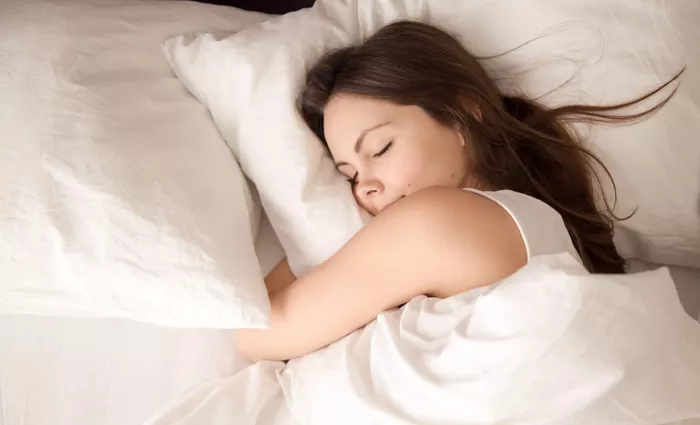Menopause, a natural biological process marking the end of a woman’s reproductive years, brings about a wide range of symptoms, many of which can disrupt sleep. While these changes are a hallmark of women’s health, the ripple effect extends to their partners as well, affecting women’s health and wellbeing. This article delves into the connection between sleep disturbances during menopause and how they can influence both women and men, offering advice on improving sleep hygiene and emotional well-being.
Understanding Menopause and Sleep Disturbances
Menopause is officially diagnosed when a woman has gone 12 months without a menstrual period, marking the end of her reproductive years. But the transition leading up to this period, known as perimenopause, can cause many symptoms, including sleep disturbances. These changes are often accompanied by physical symptoms such as hot flashes, night sweats, and increased heart rate, all of which contribute to poor sleep.
As hormone levels fluctuate, particularly estrogen and progesterone, women may experience trouble falling or staying asleep. Furthermore, conditions like sleep apnea become more prevalent as women age, with the physical changes in their bodies during menopause – such as an increase in body fat – contributing to these issues.
While menopause itself is a female-specific process, men, particularly those in long-term relationships, may also experience secondary effects. Sleep disturbances are often heightened by shared physical symptoms like excessive sweating, irritability, and emotional stress, which can disrupt partners’ rest and create a negative cycle of poor sleep and stress.
The Impact on Mood and Mental Health
Alongside physical changes, menopause often brings about emotional changes that can further exacerbate sleep problems. Depression, anxiety, and irritability are more common during this time due to fluctuating hormone levels. Men may find it challenging to support their partners when they feel overwhelmed by these mood changes.
Research shows that sleep disturbances associated with menopause can lead to decreased quality of life, affecting relationships and overall health. For example, men may experience a higher level of stress and frustration as they try to adjust to their partners’ new sleep patterns, which can lead to communication breakdowns or a sense of isolation.
It’s important for both men and women to understand that emotional support, good communication, and empathy play significant roles in improving sleep during this challenging phase.
Practical Tips for Improving Sleep During Menopause
Focus on Sleep Hygiene:Encourage practices that promote better sleep, such as creating a dark, quiet, and cool environment. Avoid using electronic devices before bed and stick to a consistent sleep schedule.
Exercise Regularly:Physical activity can help regulate sleep cycles and reduce symptoms like night sweats and anxiety. Try moderate activities like walking, yoga, or swimming.
Watch Your Diet:Reduce caffeine and alcohol intake, especially in the evening. These can worsen sleep disturbances by increasing body temperature or promoting restlessness.
Relaxation Techniques:Practices like yoga, meditation, and progressive muscle relaxation can help reduce stress and prepare the body for restful sleep. Consider incorporating calming activities into your evening routine to wind down.
Seek Professional Help if Needed:If sleep issues persist, it may be time to seek guidance from a healthcare professional. Options like hormone therapy, cognitive behavioral therapy for insomnia, or other medications can help manage symptoms effectively.
Support Each Other:Men should be aware of the emotional toll that menopause can take on their partners. Offering a listening ear or simply showing understanding can improve both their emotional well-being and sleep quality.
The Role of Hormone Therapy
In many cases, hormone therapy (HT) is used to alleviate some of the symptoms of menopause, including sleep disturbances. While HT is not suitable for everyone, it can significantly reduce hot flashes, night sweats, and mood swings. It’s important to have a conversation with a healthcare provider to weigh the risks and benefits of hormone replacement therapy (HRT) based on personal health history.
Other medications, such as selective serotonin reuptake inhibitors (SSRIs), can also help with the mood-related symptoms of menopause that affect sleep. Exploring these options with a doctor can provide relief for both men and women experiencing these issues.
The Importance of Addressing Sleep Issues
Ignoring sleep problems can lead to a host of other health concerns. Chronic sleep disturbances can contribute to fatigue, mood disorders, weight gain, and even cardiovascular issues. For men, poor sleep linked to menopause symptoms in their partners can also affect their own health, leading to increased stress and a higher risk of developing conditions like high blood pressure or diabetes.
It’s essential for men to actively engage in supporting their partners through this life phase, promoting open communication, and fostering healthy sleep habits.
Conclusion
Menopause can deeply impact a woman’s health, especially her sleep. Understanding the hormonal, physical, and emotional changes can help both partners navigate this transition with greater empathy and support. By implementing healthy sleep habits, seeking professional care when needed, and maintaining strong communication, both men and women can reduce the impact of sleep disturbances during menopause.
Related articles:
- Menopause: The Truth About Sleep
- Best Cooling Products for Menopause: Beat the Heat & Sleep Better
- Menopause: What To Take To Help Sleep


